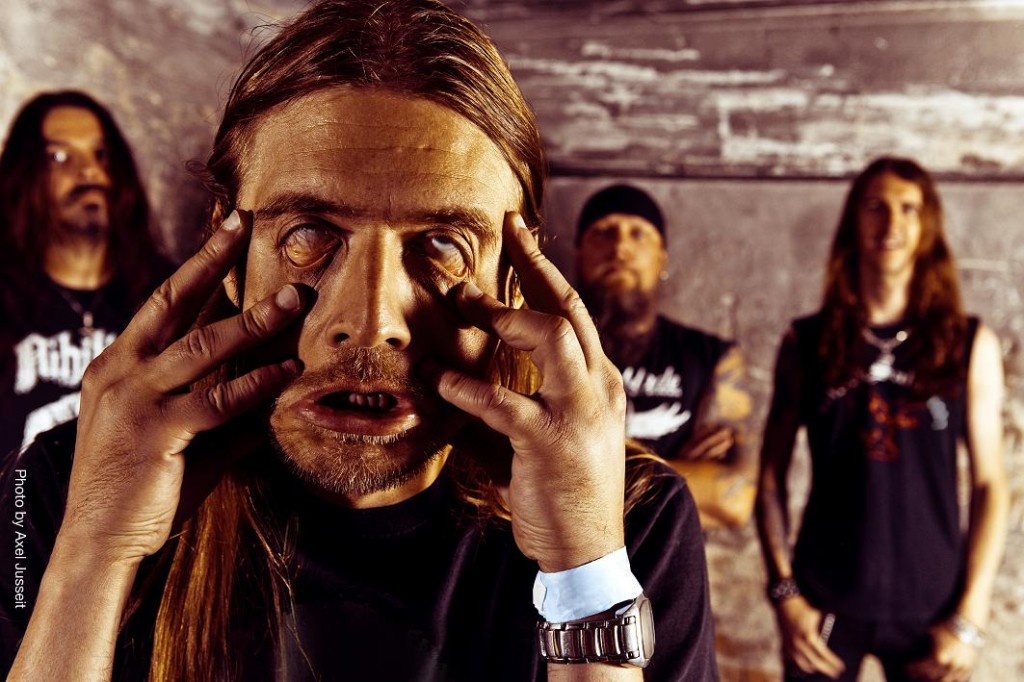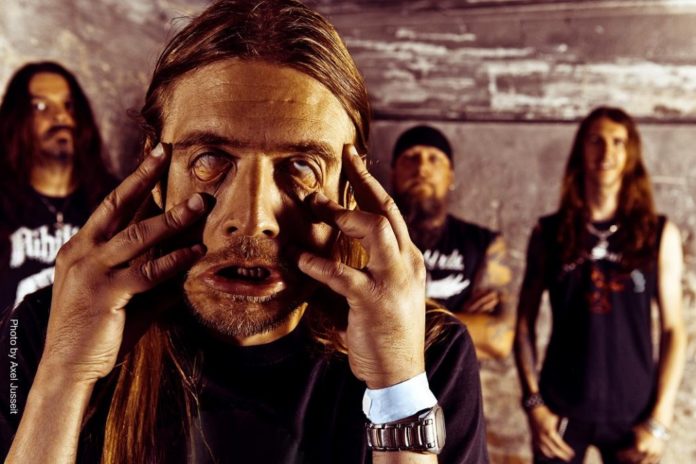Having been one of the mighty forefathers of Swedish death metal, there haven’t been too many things that a band like Grave has not accomplished. They have toured the world over, released a plethora of music that is held up on a pedestal, and still manage to continue to be on the front lines of death metal.
We had the chance to catch up with Grave mastermind Ola Lindgren during their performance in Utrecht, Holland (together with Marduk, Valkyrja and Death Wolf) and managed to get some insight on what still keeps this legend going.
We wouldn’t be doing this if it weren’t for the fans.
Metal Blast: Grave are one of the forefathers of European death metal, and while you guys have had your share of ups and downs through the years, it seems that more legendary bands are beginning to call it quits, like Dismember and Vomitory. Despite this hard truth, Grave has marched on. What are some of the inspirations that helps get you guys by and continue onward?
Ola Lindgren: It’s all about the fans, really. If they weren’t buying any records we would have stopped already. When we tour promoting the new stuff we always try to connect with them, and the response has always been great.
Metal Blast: In the topic of fans buying records; do you find that in these 25 years of Grave, the way in which a metal band has to survive has changed? Going from touring to promote an album to releasing an album to promote a tour, etc. How have these changes affected Grave throughout this time?
O: I’m not sure, really. I think we’re more consistent these days, and spend more time writing. Also, now touring is more to promote newer material rather than playing for the fun of it, you know?
MB: Well, a big part of the income of a band now has to come from touring.
G: Yes, that’s another big change. In the early days we did a lot of touring but it wasn’t the same thing; back then it was more about promoting the band, getting to some point of acknowledgement. By the second half of the 90s, however, that was pretty much done and we just kept going to keep the name alive, even though we also enjoyed it; if we didn’t enjoy it we wouldn’t keep doing it!
MB: There was, however, a moment in which Grave had to stop. What happened there?
O: There were some very slow years for death metal in the late 90s… there wasn’t really any interest from labels or fans. Fans were striving more toward black metal and newer melodic metal. We didn’t feel there was any space for us anywhere. We talked to the label, they weren’t pushing us to put anything new out, but they didn’t decline us either. The years 1991-1996/1997 were so hectic that it seemed like a good idea to just lay it out on ice. A few years later in early 2000 we starting rehearsing and doing new stuff again, leading to the Back from the Grave album.
MB: Did you feel that a “space” for Grave had appeared then? Or was it just, ‘fuck it, we’ll do it anyway?’
O: We didn’t really feel a change, but there was so much shit coming out. I mean, nothing good came out in those years! We got together and did some pre-production stuff, sent it to Century Media and they were very interested. That release got very good reviews and it felt like people thought that something that had been missing for a number of years in those genres was, finally, coming back.

MB: It’s interesting that you mention that there was nothing good coming out… I was recently talking with Nick Holmes, the lead of Paradise Lost and one of the things that we agreed upon was that one of the problems for older bands is that what they understood to be their own genre, in your case death metal, changed a lot over the years. Maybe there’s some industrialization, a cheapening of the music, aiming toward the lowest common denominator. How do you perceive that? I mean, have you found that the music industry has taken a dive in terms of the quality of the output?
O: I think so, in some ways. There are so many bands now that is so much easier to get something out. In the old days only the really good bands got signed, got pushed. Nowadays it’s really up to no one, or up to yourself if you want to get something else. A case of overflow in the market. There’s so much stuff out there, I don’t personally feel the need or the interest to keep up or check everything out. It’s seldom that I discover a new band that I really like that I haven’t heard, that has something unique.
MB: I guess uniqueness is really the issue here; it’s like everything has become serialised, someone found the recipe and everything followed. Nick and I talked about Goth Metal, for example, and how at some point it became ‘find a girl, put a corset on her, stick her onstage’. And it serialised, definitely. In the case of death metal, I think it’s similar.
O: Yeah, it’s weird; I don’t listen to music like that. If someone says, “listen to this band, they sound like Morbid Angel”, I’m like, “I’d rather listen to Morbid Angel!”. I already know them! I want something unique. It’s hard today to release anything without reminding the listener of something else. There are always influences, but the material it has to have something of your own.
MB: A few months ago you released the Morbid Ascent EP. What is it exactly; is it independent or a taste of thing to come?
O: I guess it’s a good link between the last full-length and what’s going to be the next album. Century Media asked us about the idea, because the last album did really well and we toured loads, so there was lots of momentum. It seemed like a good idea to release it a year after the last album, and a year before the next one, which should be out about the same time next year. It’s a good thing to get keep the momentum going, getting acknowledged in magazines again, and to be able to tour for something new.
MB: How important is the publicity given to you by critics?
O: I think it’s pretty important actually. Still.

MB: You are the first person to say that.
O: yeah?
MB: I appreciate the honesty! Everyone says ‘no I don’t care’, but it is important…
O: Yeah, of course. Everyone seems to like the release; there was some cool stuff in there, in terms of artwork and packaging. The only thing was that it wasn’t released on CD, but that makes it more special, more collectible…
MB: In your songs (Passion of the Weak being a recent example) there is a lot of anti-religious and anti-Christian lyrical content. Is there a philosophy behind Grave, a unifying philosophy throughout your career, or do you think you keep to this because it’s interesting each time?
O: No, it’s not a philosophy. The lyrical content from the start up until now is religious criticism as well as the usual blood and guts lyrics…
MB The fun things!
O: Yeah, the fun things [laughs] And there are some made-up stories too.
MB: Talking with bands like Marduk and Valkyrja, I get the impression that for them the emphasis is on lyrical content. Would it be correct to say that with Grave the music come first and the lyrics second?
O: They have to go hand-in-hand, but I see the vocal parts more like another instrument that contributes something to a song, not something special. I’d prefer it that way than with crappy vocals and a strong message.
MB: Going back to the EP, I thought that it was interesting that you covered “Possessed”, by Satyricon. Instead of going back to their old releases, you went for a recent one. Why?
O: I don’t like the early Satyricon stuff! [Laughs] I think it’s horrible. From Rebel Extravaganza onwards is what I like. We wanted to do something not death metal, but that we could still make sound like Grave. I mean, we couldn’t do a classic black metal song, for instance, since that’d be totally wrong. This Satyricon song, however, is quite thrashy and fits really well, so it was pretty easy to do. Not as hard as I expected it to be.
MB: What do you mean black metal would have been wrong? In the sense that it’s not what Grave is about?
O: Yeah, in the sense that the chords that you have in a black metal song wouldn’t have fitted so well as those in “Possessed”. It’s more of a thrash metal song than a black metal song in many ways.
MB: I agree; it really has that vibe and, most importantly, you guys really did it justice in the EP.
Something that always attracted me to Grave is the fact that all of your albums have managed to keep this very dark and oppressive sound to them. Since you’re so closely related to it, tell me about the process of mixing and producing?
O: I own a studio in Stockholm where we do everything. It’s a matter of finding from the start, from the recording, all the right sounds, since it makes it so much easier when you come to the mixing process since you no longer need to search for the right feeling. With the EP we spent a lot of time trying out different amps, mics on drums, and that sort of thing; in a way it’s a very clean album, not processed at all. Everything that’s on there is pretty much the way we recorded it, despite some small tweaks that we did during the mastering process.
MB: Being in charge of mixing and producing, what do you prioritize? Going back to Nick Holmes, he mentioned that one of the problems nowadays is that that everything is tweaked similarly, so that everything sounds the same across the musical spectrum. In your extensive experience, what do you try and accomplish?
O: Every instrument needs to be clear. A good sound landscape, where everything has its place and everything comes together with a good feeling. Powerful, but separated.
MB: I remember that when black metal started, there was this desire to be inaccessible. Varg Vikernes of Burzum, for instance, deliberately got the worst guitar, the worst recording, the worst studio, just for that. When you were starting off as a musician, at that same time, how did you feel regarding this aspect of music?
O: I think we always wanted to sound good! [laughs] This aspect has never crossed our mind. I mean, we have some terrible demo stuff, but that has to do with the context and recording of those times.
MB: With the exception of a couple of releases, all of your releases have been out out through Century Media Records. This puts you in a rare and privileged position, since it is rare to find a band that sticks with one label for so long. What is it that makes this partnership between both camps so strong?
O: I’m not sure really. After we did our first seven albums with them, we were without a label for the first time in 15 years or so; they were still very interested in re-signing us, but we were keen on trying something new, since didn’t know anything else. We shopped around, talked to a lot of interested labels, and eventually went for Regain and did two albums with them. It was a completely different experience, since their organization is much smaller; after those two albums we were free again, and Century Media got us back. It wasn’t a hard choice, since we knew all the people there, and knew who to talk to about what. They do good work, one of the few big labels still out there.
MB: I was talking with the guys from Valkyrja earlier today, and they mentioned that one of the reasons why they left Metal Blade was that it was very hard to deal with the “music INDUSTRY”. After 25 years, does the commercial/industrial part of the business faze you, or do you accept it as a mandatory part of the process?
O: Yeah, there’s nothing you can do. We’ve been lucky in a way, with good contracts and connections, so there have never been any arguments or discussions. We’ve always known what we have signed and got ourselves into; still, it is a shitty business, one of the worst in the world for the workers.
MB: In what sense?
O: You borrow money from yourself to record, then pay that money off before getting royalties. Nobody gives you money to record and make money from the first album sold.
MB: Due to the problems with the low sale of records, many bands complain that they find themselves needing to do things that they never needed to do before, such as releasing limited editions, etc.
O: There’s more of that with more formats, more chances to release the same product.

MB: How much say does the band have with things the label does in terms of releasing new material?
O: A lot, actually. We always talk about it before a new release, down to format, packaging and bonus tracks.
MB: I read that you’re playing a show in New York for New Year’s…
O: The rumor is out there; I don’t where it came from, but it’s not true… I wouldn’t mind doing it though, I mean, I love New York! [Laughs]
MB: Never mind then!
So, tell me a little about this album that we hope to see next year.
O: We’re working on songs right now between tours. We have a lot of material ready and we’re trying to keep the same atmosphere we had in Endless Procession of Souls or on our previous EP; good catchy songs that get your attention. We’re spending a lot of time in the recording and mixing process, which is what I really enjoy doing anyway. It’s good to have your own place without worrying about the cost of a studio, since it’s a very relaxed way of working.
Hopefully we’ll have everything done early next year and release, maybe, in September.
MB: Are the songs already written?
O: Nothing complete yet, no. We’re just collecting riffs, but there are a lot of ideas.
MB: With such an intensive touring schedule it must be very hard to be able to sit down, write and play.
O: Yes, it is hard. When we did Endless Procession of Souls we wrote everything in 6-8 weeks and recorded immediately after. We need a period of a good 3-4 months to complete the whole process.
MB: I’ve taken enough of your time and I know that you’re about to hit the stage so… any final message for your many many fans?
O: Just a huge thanks for supporting the band throughout all these years. We wouldn’t be doing this if it weren’t for you. Hopefully you’ll keep enjoying what we do and… see you out there!
MB: Any Christmas messages?
O: Don’t believe in Santa Claus! [laughs]

